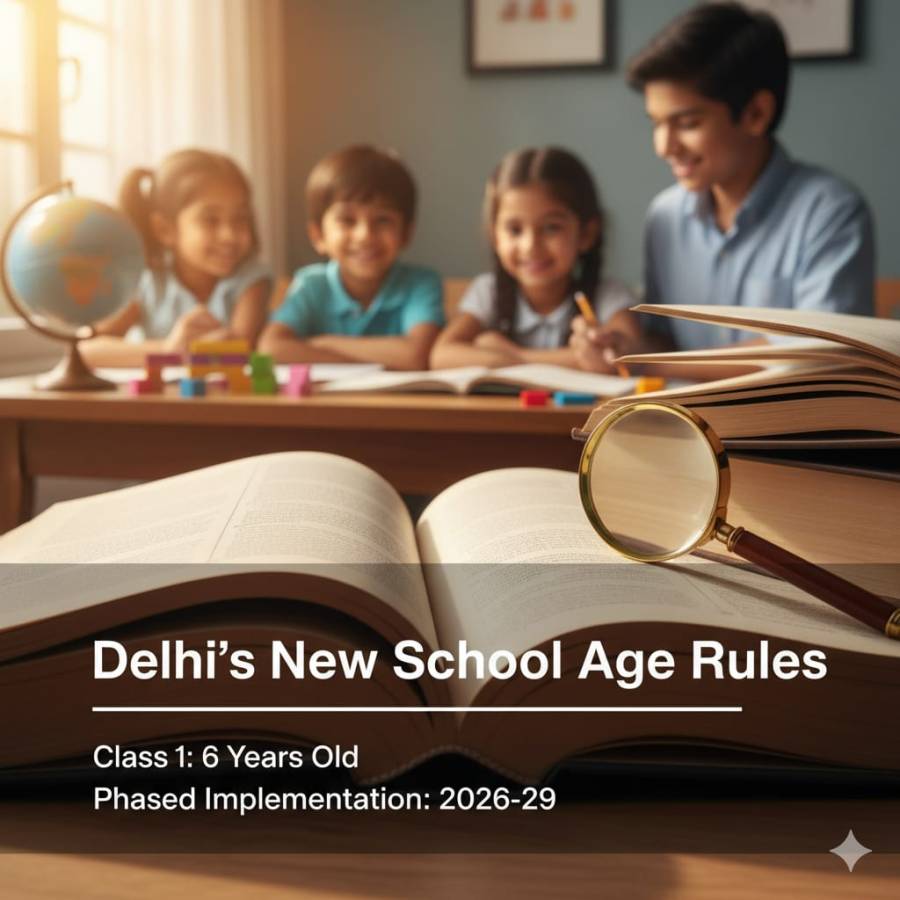
The Directorate of Education (DoE) in Delhi has initiated a significant structural reform in the city's school admission policy, particularly for the foundational stage of learning. It comes three years after the introduction of the National Education Policy (NEP) 2020, which mandates a uniform minimum age of six years for admission to Class 1, effective from the 2026-27 academic session. It aims to standardize school entry ages to ensure children are ready for formal schooling, and align Delhi's education system with the progressive vision of the NEP.
Restructuring the Foundational Stage
The DoE circular, issued on October 24, mandates a comprehensive restructuring of the foundational stage, which includes the earliest years of schooling. The traditional Nursery and KG classes are being redefined and integrated into a structured system that leads up to Class 1. The new structure introduces clear, and non-negotiable age criteria for entry level. This reform is meant to ensure a consistent academic journey for every child in both government and recognized private schools.
The revised age requirements, as of March 31 of the admission year, are as follows:
- Nursery (Upper KG): 5-6 years
- Lower KG (Class 1 admission only): Passing Upper KG in 2027-28
- Upper KG (Class 1 admission only): Passing Lower KG in 2027-28
- Class 1: 6-7 years
The circular clarifies that new admissions for Lower KG will start in 2027-28 for students passing Nursery, and Upper KG new admissions will begin in 2027-28 for students passing Lower KG. Crucially, the minimum age for Class 1 admission is set at six years, a departure from the previously variable age criteria across schools. The DoE has given school heads a limited discretion to grant an age relaxation of up to one month in both the minimum and maximum age limits for admissions from Nursery to Class 1, a provision designed to address borderline cases without fundamentally compromising the new uniform structure.
A Phased Implementation for Smooth Transition
Recognizing the logistical complexities of such a sweeping change, the DoE has stipulated a phased implementation plan to ensure a smooth transition for existing students and schools. The full effect of the six-year-for-Class-1 rule will be achieved gradually over three academic sessions.
- Session 2026-27: The new age criteria for Nursery (3-4 years) will be fully implemented.
- Session 2027-28: New admissions for Lower KG (4-5 years) will commence for students entering school for the first time, while students who were in Nursery in 2026-27 will automatically progress.
- Session 2028-29: New admissions for Upper KG (5-6 years) will commence, and the mandatory six-year minimum age for Class 1 will come into full effect for all new students.
Students who are currently enrolled in any class during the 2025-26 academic session, or those who gain admission by March 31, 2026, will not be affected by the new age criteria for their subsequent promotions. They will continue their academic journey under the existing structure, preventing any disruption to their educational trajectory. This transitional provision is vital for maintaining continuity and addressing parental concerns about mid-stream changes to their children's schooling.
The Educational Rationale: Alignment with NEP 2020
The fundamental driving force behind this reform is the National Education Policy (NEP) 2020. The NEP advocates for a 5+3+3+4 curricular and pedagogical structure, where the first five years constitute the Foundational Stage (ages 3-8, including three years of pre-primary and Classes 1-2). This initial stage is intended to focus on play-based, activity-driven, and discovery-oriented learning, nurturing essential cognitive, socio-emotional, and physical skills.
By enforcing a six-year entry age for Class 1, the Delhi government is ensuring that every child completes the developmentally crucial three years of pre-primary education (Nursery, Lower KG, and Upper KG, or their nomenclature variants like Balvatika) before commencing formal academic instruction. This preparatory period is paramount for building foundational literacy and numeracy skills, which form the bedrock of all future learning. Education experts have repeatedly stressed that a staggered entry age often leads to learning disparities, with some children starting Class 1 without the necessary developmental maturity.
The move has been welcomed by various stakeholders, including the Action Committee of Unaided Private Recognized Schools, whose President, Bharat Arora, lauded the phased roll-out as an essential step toward a holistic early childhood education system. The new age mandate brings much-needed uniformity and clarity, reducing the uncertainty previously faced by parents navigating disparate admission rules across different institutions. It reflects a commitment to a research-backed and child-centric approach, prioritizing the child's readiness over institutional convenience. The successful implementation of these reforms promises to lay a robust and equitable foundation for Delhi’s students, ensuring they are well-prepared for the rigors of higher education.





















